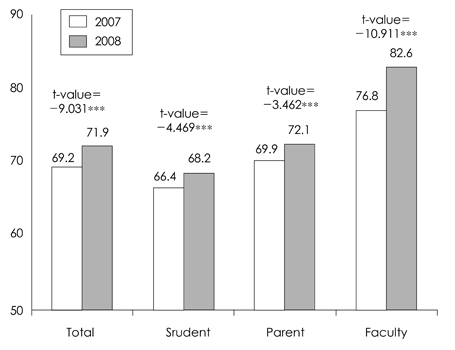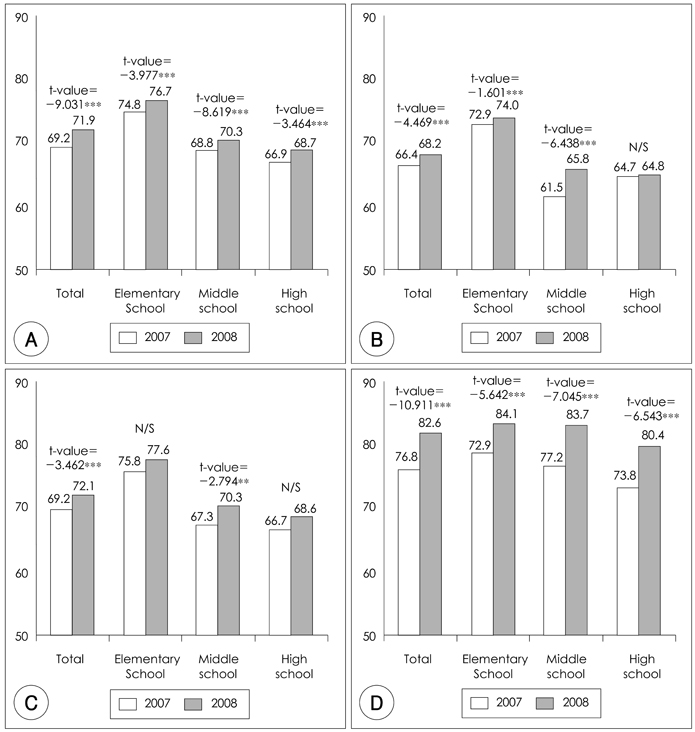Korean J Nutr.
2009 Dec;42(8):770-783.
Annual Analysis on Quality Attributes and Customer Satisfaction in School Foodservice
- Affiliations
-
- 1Department of Food and Nutrition, Hanyang Women's University, Seoul 133-793, Korea. mkpark@hywoman.ac.kr
- 2Department of Food and Nutrition, Yonsei University, Seoul 120-749, Korea.
Abstract
- The school foodservice was quantitatively extended by policy of government all the while. There was carried out the survey of customer satisfaction about school foodservice by the ministry of education, science, and technology since 2006 years. Therefore, the purpose of this study was to grasp an improvement of the scores of school foodservice' quality attributes and satisfaction as compared with the preceding year by respondents and school type (elementary school, middle school, and high school). An annual survey was practiced to respondents (students, parents, and faculty) on september 2007 years and 2008 years in 16 cities and provinces. The statistics was analyzed to descriptive analysis and t-test for SPSS 12.0. The scores of school foodservice' quality attributes and overall customer satisfaction were almost increased to students, parents, and faculty and especially, big elevation in middle school. There was big increased the quality attributes such as 'providing information on foodservice', 'pleasant foodservice environment', 'kindness offered by employee' in elementary school, middle school, and high school to total respondents. An overall satisfaction in school foodservice was improved from 69.2 score to 71.9 score. On students, scores of overall satisfaction was increased from 72.9 to 74.0 as students of elementary school and from 61.5 to 65.8 as students of middle school (p < .001). Therefore, for improvement and development of school foodservice, there should be a necessary for an operator of school foodservice and an office of education to make an effort.
Keyword
Figure
Reference
-
1. MEST: Ministry of Education, Science, and Technology. 2009 Oct. Available from www.mest.go.kr.2. Kim MY. Survey on Tasty Degree on School Feeding Foods of Elementary School Students [dissertation]. 2002. KyeongGi: National University of Education.3. Park KJ, Jang MR. Survey on Satisfaction of Fifth and Sixth Grade Students from Elementary School Foodservice in Wonju. J Korean Dietetic Assoc. 2008. 14(1):13–22.4. Lee KS, Choi KS, Yoon EY, Lee SY, Kim CI, Park YS, Mo S, Lee YM. Effect of School Children. Korean J Nutr. 1988. 21(2):392–409.5. Lee YN, Kim WG, Lee SK, Chung SJ, Choi KS, Kwon S, Lee EW, Mo S, Yoo Di. Nutrition Survey of Children Attending an Elementary School with a School Lunch Program in Socioeconomically High Apartment Compound of Seoul. Korean J Nutr. 1992. 25(1):56–72.6. Bak GB, Kim JS, Han JS, Huh SM, Suh BS. A Comparative Study on Dietary Habits of Children in Elementary School by School Lunch Program. Korean J Dietary Culture. 1996. 11(1):23–35.7. Jang HR, Kim HY. Survey on the Satisfaction Degree for School Lunch Program of Elementary School Students in Yongin. Korean J Food & Nutr. 2005. 18(2):155–160.8. Yi BS. The Plan for offering a Safe and Tasty School Foodservice Proceeding of the 2009 school foodservice workshop. 2009 Oct. Available from: http//www.mest.go.kr.9. Bouliva D. Practical, Proven Approaches to Increasing Participation. Sch Food Serv J. 1991. 45(6):100–101.10. Brown NE, Gilmore SA, Dana JT. Perceptions of Food Quality and Dining Environment in School. Sch Food Ser Res Rev. 1997. 21(1):38–45.11. Hutchinson JC, Brown NE, Gilmore SA. High School Student Perceptions Associated with Their Participation in the National School Lunch Program. J Child Nutr Mgmt. 1998. 22:87–94.12. Marples CA, Spillman DM. Factors Affecting Students' Participation in the Cincinnati Public Lunch Program. Adolescence. 1995. 30:746–753.13. Meyer MK. Middle/Junior High School Student Foodservice Survey. 1997. Oxford, Miss: National Food Service Management Institute;No R: 34-97.14. Meyer MK, Conklin MT. Variables Affecting High School Students' Perception of School Foodserivce. J Am Diet Assoc. 1998. 98(12):1424–1428.15. Meyer MK, Conklin MT, Carr DH. High School Student Satisfaction Survey. 1997. Oxford, Miss: National Food Service Management Institute;No R: 29-97.16. Meyer MK. Top Predictors of Middle/junior High School Students' Satisfaction with School Foodservice and Nutrition Programs. J Am Diet Assoc. 2000. 100(1):100–103.17. McCleary KW, Weaver PA. Improving Employee Service Levels through Identifying Sources of Customer Satisfaciton. Int J Hosp Mgmt. 1982. 21(2):85–89.18. Kim KA, Kim SJ, Jumg LH, Jeon ER. Degree of Satisfaction on the School Foodservice among the Middle School Students in Gwangju and Chonnam Area. Korean J Soc Food Cookery Sci. 2002. 18(6):579–585.19. Lee HS, Jang MH. Survey of Students Satisfaction with School Food-service Programs in Gangwon Province. Korean J Food & Nutr. 2005. 18(3):175–191.20. Kim SH, Kim NY, Lee KH. A Comparison of Students Satisfaction with School Foodservice Program by Foodservice Operation Types in Middle and High Schools Students in the Geumsan-Gun Area. J East Asian Soc Dietry Life. 2007. 17(4):597–606.21. Hyun GI, Jung BH. A Study on the Preference and Satisfaction on the Menu of School Lunch Service of High School Students in Gyeongju Area. Korean J Food Culture. 2006. 21(5):481–490.22. Yoon JH, Choo YJ, Chung SJ, Ryu SH. Satisfaction of Elementary Students Eating School Lunch; Association with Level of Involvement in School Lunch Service. Korean J Community Nutr. 2005. 10(5):668–676.23. Oh HM. Service Quality, Customer Satisfaction, and Customer Value: A Holistic Perspective. Int J Hosp Mgmt. 1999. 18:67–82.
Article24. Park MK. Using Customer Survey Data to Develop Marketing Strategies in Faculty Foodservice [dissertation]. 2000. Seoul: Yonsei University.25. Park MK. The Development of Intellectual Capital (IC) Measurement Tool on Contract Foodservice Management Company (CFMC) and Analysis of Cause and Effect Relationship of Intellectual Capital [dissertation]. 2004. Seoul: Yonsei University.26. Han KS, Yang IS, Kim DH. Development of Customer Satisfaction Measurement Scale for Contracted Foodservice Management Establishment. J Tourism Sciences. 2001. 24(3):191–208.27. Park MK. Identifying the Effect of Service Quality Attributes in an Overall Customer Satisfaction by the Foodservice Type and the Contract Management Company (CMC) Scale. J Korean Dietetic Assoc. 2007. 13(2):138–156.28. Yang IS, Park MK. 2007 School Foodservice Satisfaction Survey. Ministry of Education, Science, and Technology. 2007. Seoul: 4–5.29. Lee YE. An Analysis on the Satisfaction with the Quality of School Foodservice in Chungbuk Province. Korean J Food Culture. 2008. 23(1):105–114.30. Yang IS, Park MK. Identifying the Quality Attributes Affecting Customer Satisfaction of School Foodservice by City and Province: Students, Parents, and Faculty. J Korean Dietetic Assoc. 2008. 14(3):302–318.31. Kim EM, Jeong MK. The Survey of Children's and Their Parents' Satisfaction for School Lunch Program in Elementary School. J Korean Soc Food Sci Nutr. 2006. 35(6):809–814.32. Kim YS, Yoon JH, Kim HR, Kwon SO. Factors Affecting Intention to Participate in School Breakfast Programs of Middle and High School Students in Seoul. Korean J Community Nutr. 2007. 12(4):489–500.
- Full Text Links
- Actions
-
Cited
- CITED
-
- Close
- Share
- Similar articles
-
- Evaluation of the Quality Attribute and Satisfaction on School Foodservice in 2010
- Analysis of the Quality Attributes and the Customer Satisfaction in School Foodservice by School Type and Distribution Place
- Identifying the Effect of Service Quality Attributes on an Overall Customer Satisfaction by the Foodservice Type and the Contract Management Company(CMC) Scale
- A Study on Service Quality and Customer Loyalty of Foodservice Industry
- Identifying the Quality Attributes Affecting Customer Satisfaction of School Foodservice by City and Province: Students, Parents, and Faculty



